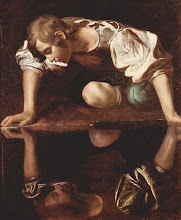 Ovid's next story (with a series of digressions) is the story of the birth of Aesculapius, the god of medicine. His mother, Coronis, was pregnant by Apollo, but had another lover. She was seen together with him by a raven, who told Apollo. Apollo then killed Coronis, but regretting what he'd done, at least managed to save the child by taking it from Coronis's womb and giving it to the centaur Chiron to bring up. (picture of crow from wikicommons used under GNU Free Documentation Licence)
Ovid's next story (with a series of digressions) is the story of the birth of Aesculapius, the god of medicine. His mother, Coronis, was pregnant by Apollo, but had another lover. She was seen together with him by a raven, who told Apollo. Apollo then killed Coronis, but regretting what he'd done, at least managed to save the child by taking it from Coronis's womb and giving it to the centaur Chiron to bring up. (picture of crow from wikicommons used under GNU Free Documentation Licence)Confusingly enough, but possibly to the original audience's amusement, the raven meets a crow on the way to Apollo. The crow, whose name we are not told in the Metamorphoses, was also called Coronis, and was a princess who had been turned into a crow by Minerva when she was trying to escape from the god Neptune who was chasing her. See Tony Kline's translation of Ovid's version of the story and Derik Badman's strip cartoon version.
Giulio Carpioni painted a picture of Neptune pursuing Coronis in the late 1660s, now in Florence's Uffizi Gallery, but not on their site. The contemporary artist David Lloyd has painted two versions of Neptune and Coronis (scroll down to see them).
Domenichino and his assistants painted Apollo Slaying Coronis (1616-1618), now in London's National Gallery. Another scene with Apollo and Coronis by Adam Elsheimer can be seen in this photo from Frankfurter Allgemeine Zeitung (note: if you have a slow connection, don't be surprised if you see another painting first). I haven't been able to track down the original painting, some sources say it is in London's National Gallery, others in Liverpool's Walker Gallery, but neither gallery's site has it.





1 comment:
And there are now literary crows too: "Crow County" by Mark Cocker recounts his ornithological obsession in a pastoral prose poem.
A bit too rich and prosy for my taste but, yesterday on BBC4, I saw that it got the GBP 30,000 Samuel Johnson prize for non-fiction.
Post a Comment